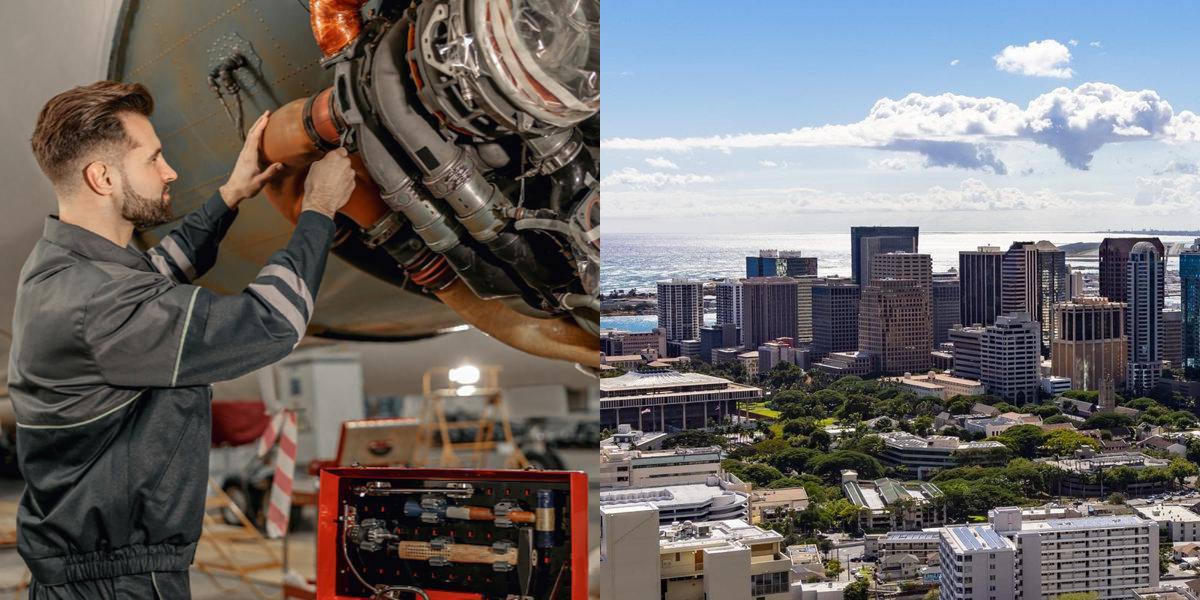How to Become an Aviation Mechanic in Hawaii

Aviation mechanics play a crucial role in ensuring the safety and functionality of aircraft. They are responsible for inspecting, repairing, and maintaining various components and systems of airplanes and helicopters. Here is a guide on how to become an aviation mechanic in Hawaii.
How do I get a job as an Aviation Mechanic?
Once you have obtained your aviation mechanic certification, the next step is to find a job in the field. Here are some steps you can take to increase your chances of landing a job as an aviation mechanic:
- Network: Networking is crucial in any industry, and the aviation field is no exception. Attend industry events, job fairs, and conferences to meet professionals already working in the field. Join online forums and social media groups dedicated to aviation mechanics to connect with like-minded individuals and potential employers.
Additionally, consider joining professional organizations, such as the Hawaii Association of Aviation Maintenance Professionals, which can provide valuable networking opportunities and resources for job seekers.
-
Gain Experience: While education and certification are important, gaining practical experience is equally crucial when it comes to finding a job as an aviation mechanic. Consider seeking internships, apprenticeships, or entry-level positions at aviation maintenance facilities, airports, or airlines. This will help you further develop your skills and make valuable industry connections.
-
Create a Standout Resume: Your resume is your first impression on potential employers, so make sure it highlights your relevant skills, experience, and certifications. Include any specialized training, internships, or projects you have worked on during your education. Emphasize your attention to detail, problem-solving abilities, and adherence to safety procedures.
-
Apply to Aviation Maintenance Facilities: Start your job search by applying to aviation maintenance facilities, airlines, or airports in your area or desired location. Check their websites, job boards, and career pages for open positions. Tailor your application materials to each specific job, showcasing how your skills and experience align with the requirements listed in the job posting.
-
Prepare for Interviews: Once you start receiving interview invitations, take the time to prepare thoroughly. Research the company or organization you are interviewing with, familiarize yourself with their operations, and come prepared with questions to demonstrate your interest and enthusiasm. Be ready to showcase your technical knowledge and problem-solving abilities through examples from your previous experience.
-
Stay Persistent: Finding a job in any field can be challenging, so don't get discouraged if you don't receive immediate job offers. Stay persistent in your job search, continue networking, and consider expanding your search to different locations or types of aviation maintenance facilities. Persistence and dedication will eventually pay off.
Career Paths and Opportunities after Becoming an Aviation Mechanic
Becoming a certified aviation mechanic opens up a wide range of career paths and opportunities within the aviation industry. Here are some potential career paths you can pursue:
-
Airline Maintenance: Many aviation mechanics find employment with airlines, working in their maintenance and repair departments. Airlines rely on mechanics to ensure the safety and airworthiness of their aircraft fleet. These positions offer stability, benefits, and opportunities for career growth within the airline industry.
-
General Aviation: General aviation encompasses private and smaller aircraft, including business jets, helicopters, and small propeller planes. Working in general aviation maintenance can provide a diverse range of experiences, as you may work on various types of aircraft and perform different tasks.
-
Corporate Aviation: Corporate aviation involves maintaining and servicing aircraft owned by corporations or high-net-worth individuals. These positions often come with higher salaries and more specialized work, as corporate aircraft tend to have more sophisticated systems and technologies.
-
Government and Military: Aviation mechanics can also find employment opportunities with government agencies, such as the FAA or the Department of Defense. These positions often involve working with military aircraft or overseeing regulatory compliance in the aviation industry.
-
Aircraft Manufacturers: Another career path for aviation mechanics is working for aircraft manufacturers. These positions involve assembly, testing, and inspection of new aircraft during the manufacturing process.
-
Specialized Roles: As you gain experience and develop expertise in specific areas, you may have the opportunity to pursue specialized roles within the aviation maintenance field. These roles can include avionics technicians, sheet metal mechanics, aircraft inspectors, or quality control specialists.
It is important to note that continuing education, obtaining additional certifications, and staying updated with the latest advancements in aircraft technology can significantly enhance your career prospects and open doors to more specialized and higher-paying positions.
Final Thoughts
Becoming a certified aviation mechanic requires a combination of education, experience, and certification. By following the steps outlined above, you can set yourself on a path to a rewarding career in the aviation industry. Remember to network, gain practical experience, and stay up-to-date with industry advancements to increase your chances of finding a job as an aviation mechanic. Once you have established yourself in the field, various career paths and opportunities will be available to you, providing you with a fulfilling and challenging career. So, if you have a passion for aviation and enjoy working with your hands, consider embarking on this exciting career journey.
Are you thinking about a job change or wanting to learn more about different career paths? Feel free to check out these additional articles:

Blessed Joy Amarga is part of the Growth and Sales teams at Dreambound. She helps bring in new leads, increasing the number of people at the top of the sales funnel, and supporting the team in creating graphics to boost social media engagement. Blessed is also a Licensed Architect. Outside work, she enjoys traveling and exploring new places for her vlog.




